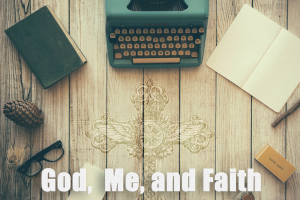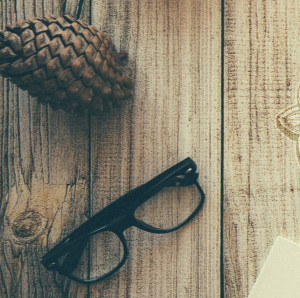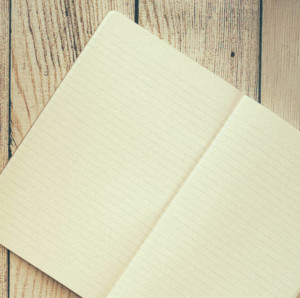 There are days I imagine myself without my Christian faith, where I exist as a self asserting powerhouse of a woman, unconcerned how my views may collide with the views of others, whether they be Christian or non-Christian. I see an alternate version of myself conquering each day with confidence and complete honesty, unfazed by the scrutiny of others, unfazed by the possibility of an afterlife in hell, and instead am only concerned with what needs to be accomplished on the ground I walk, in the here and now. I am jealous of the freedom of the non-believer to “just be,” her ability to subscribe to the belief that the self is all we need, yet I cling to a faith that while it claims promises of freedom, often leaves me conflicted about my Christian identity and suspicious of God. On a continuous loop are the questions: Am I enough to love? Will I ever be enough? And is my need to be enough directed at the right God? The search for an authentic and free Christian self often feels like swimming in choppy, unforgiving waters. And yet I have no intention of surrendering to the currents that threaten me, because I cannot imagine the spiritual death that would follow. The challenges of being a Christian in America as a black woman, writer and educator, requires unending reflection and is at all times a struggle.
There are days I imagine myself without my Christian faith, where I exist as a self asserting powerhouse of a woman, unconcerned how my views may collide with the views of others, whether they be Christian or non-Christian. I see an alternate version of myself conquering each day with confidence and complete honesty, unfazed by the scrutiny of others, unfazed by the possibility of an afterlife in hell, and instead am only concerned with what needs to be accomplished on the ground I walk, in the here and now. I am jealous of the freedom of the non-believer to “just be,” her ability to subscribe to the belief that the self is all we need, yet I cling to a faith that while it claims promises of freedom, often leaves me conflicted about my Christian identity and suspicious of God. On a continuous loop are the questions: Am I enough to love? Will I ever be enough? And is my need to be enough directed at the right God? The search for an authentic and free Christian self often feels like swimming in choppy, unforgiving waters. And yet I have no intention of surrendering to the currents that threaten me, because I cannot imagine the spiritual death that would follow. The challenges of being a Christian in America as a black woman, writer and educator, requires unending reflection and is at all times a struggle.
As a Black woman in America, to love God, I have to actively internalize that the patriarchal America and God are not one and the same. God is not the America that turned the great commission into a mission of white supremacy and imperialism. God is not the America that justified slavery by asserting Blacks were cursed by Ham, and therefore, inferior to the white race. The God I love is not the America that since slavery has maintained its oppressive dominance over the very systems that are designed to protect us, serve us, and provide equal opportunities to prosperity. I have to remind myself to rest in the fact that the patriarchy, not God, is what has claimed ownership over women’s bodies since America has claimed ownership of this land. From the master’s possession of my ancestors and their offspring, to being the physician’s object of experimentation, to a government that fights to legislate over my and my daughter’s reproductive rights, the patriarchal God stands false and strong.
Remembering the difference would possibly be easier, had that false patriarchal God’s values not settled into my own parents, whose orders for me to obey were accompanied with the master’s belt of compliance, creating welts and bruises and memories that said submission through violence is a permitted and valued tradition. I hid my bruises with long sleeves on hot days, covering my shame and protecting my parents’ patriarchal history, their parent’s history of maintaining control with the rod. The patriarchy as a symbol of God is powerful, and I am still capable of blurring the lines of it and the God I found in my childhood, to the point of dissolution.
 Surprisingly, or maybe not so much, my parents sent me to church when I was a kid. I learned enough about God and Jesus to understand there was something out there that I could reach toward for comfort, in order to not feel alone. At a young age, I prayed simple fanciful little kid prayers. “God, please let Martin like me.” Or, “please tell Mama and Daddy to let me go to the movies with my cousins.” And if I had been in trouble and got on restriction (which happened often), I’d pray, “God, please tell them to let me off restriction and I’ll never do ‘it’ again.” Naive, but sincere, those prayers were the first times I began to reimagine my circumstances – it was my first striking out into a world where hope that God was listening, was real. In adolescence, my prayers expressed needs of a different suffering. I had to integrate into them new vocabulary, like “violators” and “abusers”. To recover in those years, I’d get permission to take walks. I ventured across the street where I’d descend down a dirt trail and once at the bottom, I’d look behind me and my house was out of view, and what was visible was the cratered hill flanked by weeds and tumble-brush. Ahead of me, lay an open road, and it was the vastness of the empty field on either side of me that offered freedom to imagine without the judging eyes of my parents. The brown hills behind the railroad tracks that bordered this small valley, with burnt skeleton trees (from summer fires) were a destination – a dreamy place where I could become more than just the property of parents, who didn’t seem to see any hills in the distance for me. That landscape of solitude, with only the sound of my feet scratching the gravel beneath me, brought a lulling peace. Though I could not have articulated it then, God was neither man nor woman, but the earth and land that offered possibilities, and I basked and felt love in this nurturing refuge.
Surprisingly, or maybe not so much, my parents sent me to church when I was a kid. I learned enough about God and Jesus to understand there was something out there that I could reach toward for comfort, in order to not feel alone. At a young age, I prayed simple fanciful little kid prayers. “God, please let Martin like me.” Or, “please tell Mama and Daddy to let me go to the movies with my cousins.” And if I had been in trouble and got on restriction (which happened often), I’d pray, “God, please tell them to let me off restriction and I’ll never do ‘it’ again.” Naive, but sincere, those prayers were the first times I began to reimagine my circumstances – it was my first striking out into a world where hope that God was listening, was real. In adolescence, my prayers expressed needs of a different suffering. I had to integrate into them new vocabulary, like “violators” and “abusers”. To recover in those years, I’d get permission to take walks. I ventured across the street where I’d descend down a dirt trail and once at the bottom, I’d look behind me and my house was out of view, and what was visible was the cratered hill flanked by weeds and tumble-brush. Ahead of me, lay an open road, and it was the vastness of the empty field on either side of me that offered freedom to imagine without the judging eyes of my parents. The brown hills behind the railroad tracks that bordered this small valley, with burnt skeleton trees (from summer fires) were a destination – a dreamy place where I could become more than just the property of parents, who didn’t seem to see any hills in the distance for me. That landscape of solitude, with only the sound of my feet scratching the gravel beneath me, brought a lulling peace. Though I could not have articulated it then, God was neither man nor woman, but the earth and land that offered possibilities, and I basked and felt love in this nurturing refuge.
I struggle. When I see video recordings of police cutting down young black boys without weapons and then listen to Christians who watched the same recordings, tell me that what I saw is something else, the ground beneath me gets shaky. When I observe a Christian woman denying rights to gay and lesbian couples, allowing her faith to precede her duty as a civil servant, and as she flings her arms in the air in supplication to God in heaven, I look to the sky looking for two Gods, the one she knows, and the one I thought I knew. I try to remember what Paul, who had previously said women were the subjects of their husbands, says in Galatians – 3:28 There is neither Jew nor Gentile, neither slave nor free, nor is there male and female, for you are all one in Christ Jesus. So, it seems to me the Apostle Paul evolved and ascribed equality under God’s law in the entrenched patriarchy of his time. What do other Christians make of his spiritual journey toward equality? When I hear Christians defend rapists by questioning the victims’ behavior, their clothing, the time lapse in the reporting of their terror, I want the God I know to please stand up. I think my reasoning must be flawed, and I need clarity. Mass murder in our churches, our theaters, our schools, followed by prayers and candlelight vigils, and before the last candle is put out, protests for retaining 2nd Amendment rights proliferate the internet. The most recent example is amongst the residents of Roseburg, Oregon. Is there any room to discuss our own possible complicity in the violence in this country? Again I wonder, do we serve the same God?
 After all of my anger, the fear to voice my frustration, my fear after I voice my frustration, my disdain for the patriarchy of this country, I do not end in despair. After I have linked America’s systems of oppression, the love for violence against one another and against the planet, all back to the hubris of the American patriarchy, I settle into believing that there is potential for a more loving, equitable, future, anyway, because of the God I know. The old spiritual that starts, “On a hill far away, stood an old rugged cross,” has meaning. The song reminds me of the hill that I looked to in my childhood, that provided a way for me to imagine and create a future that promised a life I could not see, but knew was better than the one I was living. The song goes on, “I will cling to the old rugged cross, and exchange it one day for a crown.” The story of a father sacrificing his son frees me. And no matter what the belief of the masses is about the truth of the cross, for me, it doesn’t matter, because the very idea that a father could sacrifice his son, and that son understood the value of his life and death enough to obey his father, that two generations of men in time eternal, could sacrifice, suffer and love so deeply, is a miracle that tells me I am good enough.
After all of my anger, the fear to voice my frustration, my fear after I voice my frustration, my disdain for the patriarchy of this country, I do not end in despair. After I have linked America’s systems of oppression, the love for violence against one another and against the planet, all back to the hubris of the American patriarchy, I settle into believing that there is potential for a more loving, equitable, future, anyway, because of the God I know. The old spiritual that starts, “On a hill far away, stood an old rugged cross,” has meaning. The song reminds me of the hill that I looked to in my childhood, that provided a way for me to imagine and create a future that promised a life I could not see, but knew was better than the one I was living. The song goes on, “I will cling to the old rugged cross, and exchange it one day for a crown.” The story of a father sacrificing his son frees me. And no matter what the belief of the masses is about the truth of the cross, for me, it doesn’t matter, because the very idea that a father could sacrifice his son, and that son understood the value of his life and death enough to obey his father, that two generations of men in time eternal, could sacrifice, suffer and love so deeply, is a miracle that tells me I am good enough.
It is that miracle that gives me hope that my son, who has never spoken a word since he was two, will one day speak again, that black people who are not the doting immigrants of this country, but the stolen chattel that built it, will see ourselves as the builders of empires, and that we would fiercely love ourselves in all our glory. It is this wonder that gives me permission to believe honesty and creativity paves a clear but rocky path to walk in my here and now truth, and to know that questioning others, struggling in that truth is human and that’s all that I am. That’s all any of us are. Finally, the hill with the cross, with the face of humanity, staked to the earth I love, is the symbol that relieves me of my fear of what others think, of the shame of my past, and the fear of the afterlife, and it allows me to regain a faith that doesn’t seem to want to let me drown in disbelief.


Comments
Awesome! Deep sentiment and reflection. Thanks for baring your inner self.